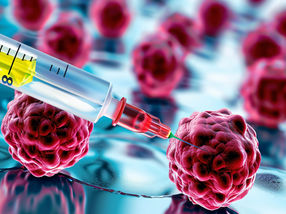Vitamin-mediated Cell Delivery of Oligonucleotides
Link Technologies Ltd has announced the availability of a novel vitamin modifier, which has shown in initial tests to have the potential of improving cell delivery of oligonucleotides. The new reagent, 5’-Niacin-CE Phosphoramidite, is easily incorporated during solid phase oligo synthesis. The niacin-based modifier from Link offers several advantages over the use of conventional lipophilic delivery agents, including reduced risk of in vivo toxicity, and removes the necessity of cleaving the delivery reagent once in the cell. These benefits make vitamins, including niacin, an attractive method for the delivery of therapeutic oligonucleotides, such as siRNA, into cells.
While lipophilic modifier reagents have been shown to enhance cell penetration, vitamin-mediated cell delivery offers a distinct advantage due to the fact that vitamins are required, but not produced by cells. As such, it is believed that interaction with a specific binding protein is required before the vitamin-oligo conjugate is internalised. Not only does this enhance delivery and overcome the risk of toxicity, as the vitamin-based reagents are recognised by the cell, but it also offers some exciting potential for cell targeting.
Derived from niacin, an essential vitamin heavily involved in the biosynthesis of NAD and NADH, Link’s new vitamin modifier, 5’-Niacin-CE Phosphoramidite, is significantly less hydrophobic and less bulky than existing delivery agents. Whereas large lipophilic modifiers can supress an oligo’s function in vivo and therefore require cleaving, which is difficult to control, it is expected that with vitamin-based modifiers, intracellular cleavage of modifiers is not necessary. Potentially, this will lead to a reduction in required dosage of the therapeutic oligonucleotide, importantly minimising the risk of drug toxicity and side effects to the patient.
Most read news
Other news from the department research and development

Get the life science industry in your inbox
By submitting this form you agree that LUMITOS AG will send you the newsletter(s) selected above by email. Your data will not be passed on to third parties. Your data will be stored and processed in accordance with our data protection regulations. LUMITOS may contact you by email for the purpose of advertising or market and opinion surveys. You can revoke your consent at any time without giving reasons to LUMITOS AG, Ernst-Augustin-Str. 2, 12489 Berlin, Germany or by e-mail at revoke@lumitos.com with effect for the future. In addition, each email contains a link to unsubscribe from the corresponding newsletter.




















































